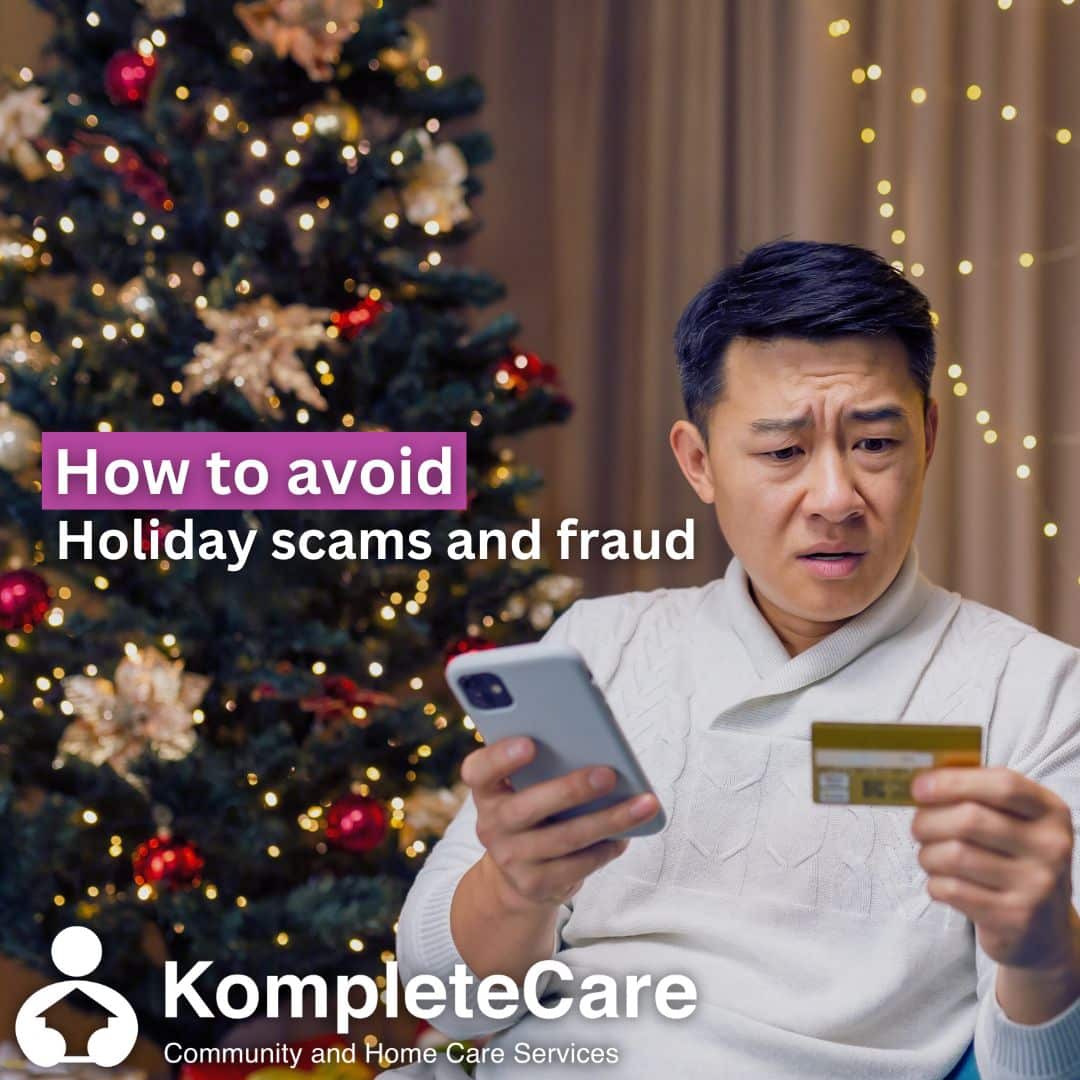The holiday season brings joy and celebration, but it also brings a rise in scams and fraud targeting vulnerable people.
These deceptive tactics can lead to significant financial loss, emotional distress, and a breach of trust, leaving a lasting impact on those affected. At KompleteCare, we understand the importance of safeguarding the wellbeing of those we care for. That’s why we’re sharing some insights on how to recognise and avoid scams. By arming ourselves with this knowledge, we can help ensure our interactions are safe and secure.
Watch out for unsolicited holiday deals
Many of us are on the lookout for great deals, but it is important to stay cautious, as fraudsters often prey on this festive spirit. You may receive unsolicited phone calls, emails, or visits from door-to-door salespeople offering deals that sound too good to be true. These scammers often use enticing offers of discounted gifts, vacations, or home repairs to manipulate individuals into sharing personal information or making hasty payments.
Red flags to look out for
- The offer is unsolicited and comes from an unknown or unverified source.
- High-pressure tactics are used, such as creating a false sense of urgency to act quickly.
- Requests for personal information or sensitive payment details, such as credit card or bank account numbers.
How to protect yourself
- Verify the offer: Always confirm the legitimacy of any offer by contacting the organisation directly. Use a known, trusted phone number or website to reach out.
- Be sceptical of deals that are too good to be true: If an offer seems unusually generous or comes with a time-sensitive push, proceed with caution.
- Secure your information: Never provide personal details or make payments over the phone unless you have initiated the transaction.
Beware of fake charities
Charitable donations see a spike during the holiday season, and scammers are aware of this. They often pose as fake charities, exploiting people’s generosity to steal money. These fraudsters may contact you via phone or email, claiming to collect donations for causes such as disaster relief, veterans’ support, or other urgent causes.
Red flags to look out for
- The charity is unfamiliar or does not have clear, verifiable contact information.
- The donation request is highly emotional or uses distressing images to encourage immediate action.
- The person requesting the donation pressures you to give right away.
How to protect yourself
- Research the charity: Always research charities through trusted sources, such as the Australian Charities and Not-for-profits Commission (ACFID), Fundraising Institute Australia (FIA), or Charity Navigator (for international organisations).
- Take your time: Do not feel pressured to donate immediately. Genuine organisations will respect your decision-making process and understand if you need time to consider your decision.
Guard against online shopping scams
Online shopping is more popular than ever, but it comes with risks—especially during the holiday season. This opens the door to fraudsters who set up fake websites or misleading social media ads, offering products at heavily discounted prices. These scammers aim to steal your payment details or send counterfeit products.
Red flags to look out for
- Watch for misspelled domain names or unfamiliar URLs. Authentic websites will have secure, recognisable web addresses.
- If the deal is too good to be true, act with caution. Fraudsters often use steep discounts as bait.
- By wary if a website asks for payment through gift cards, wire transfers, or other non-conventional methods. These are tell-tale signs for potential scams.
How to protect yourself
- Shop on reputable websites: Stick to well-known online retailers with secure payment systems. Look for ‘https://’ in the URL and check for security badges that ensure your information is protected.
- Use credit cards: Opt for credit cards over debit cards or gift cards for online purchases. Credit cards offer better fraud protection, allowing you to dispute charges if something goes wrong.
- Read reviews and verify stores: Before making any purchase, read customer reviews to gauge the reliability of the seller. Also, verify the legitimacy of the online stores by checking for clear contact information, return policies, and secure payment options.
Be aware of impersonation scams
One of the most common types of scams is impersonation, where an individual poses as a trusted person or organisation—such as a family member, government agency, or caregiver—requesting money or personal information. During the festive season, scammers may also take on the identities of holiday figures or popular celebrities, preying on your goodwill and seasonal spirit.
Red flags to look out for:
- A caller claims to be a family member or close friend in an emergency and requests money urgently.
- You receive unexpected messages from individuals claiming to be government officials or service providers, requesting personal information.
- The scammer seems to know a surprising amount about you or your loved ones—such as recent events or personal details—without a clear or reasonable explanation.
How to protect yourself:
- Be cautious of unsolicited requests: Be highly suspicious of any unsolicited phone calls or emails, especially those asking for money or sensitive information. Scammers will often create a sense of urgency to pressure you into acting quickly.
- Set up a family code word: Establish a family code word for emergency situations, so you can confirm whether a call for help is legitimate.
- Never share personal information willingly: Always verify the identity of the caller before disclosing any personal information. If you receive a suspicious call or message, contact the organisation or person directly, using a known, trusted phone number.
Monitor financial accounts regularly
Seniors and people living with disabilities are often prime targets for financial fraud as they may not be as valiant about monitoring their accounts. Scammers can gain access to bank accounts or credit cards through phishing emails, stolen personal information, or outright identity theft. Without regular account checks, fraudulent activity may go unnoticed, leaving victims vulnerable to significant financial losses.
Red flags to look out for
- Unexpected withdrawals or charges, especially if they seem out of place or do not match your spending habits.
- Missing bank statements or delayed mail can be signs of identity theft or fraud, as scammers may intercept or redirect mail to cover their tracks.
- Inconsistent or unrecognised charges on your credit card statements may indicate unauthorised use or fraud.
How to protect yourself
- Regularly review financial statements: Make it a habit to review both your bank and credit card statements regularly for any unauthorised transactions or discrepancies.
- Set up account alerts: Most banks and credit card companies offer the option to set up alerts for unusual or large transactions. These notifications can help you identify any usual activity quickly.
- Consider identity protection services or credit freezes: To safeguard your personal information, consider using identity theft protection services, which monitor for signs of fraudulent activity. Alternatively, placing a credit freeze with the major credit bureaus (such as Equifax, Experian Australia, and Illion) prevents scammers from opening new accounts in your name without your consent.
As the company with heart, KompleteCare is dedicated to empowering people with the knowledge and resources necessary to protect themselves. The holiday season, while joyful, can also bring an increase of fraudulent activity, making it more important to stay vigilant. By staying informed, recognising potential threats, and taking proactive measures, we can ensure everyone enjoys a safe and secure holiday season.
If you suspect you or a loved one has fallen victim to a scam, it is important to take immediate action. Report the incident to the appropriate authorities, such as local law enforcement, Australian Cyber Security Centre (ACSC), Scamwatch, or your bank, to prevent further damage. Early reporting can help mitigate potential losses and safeguard your personal information from being misused.









